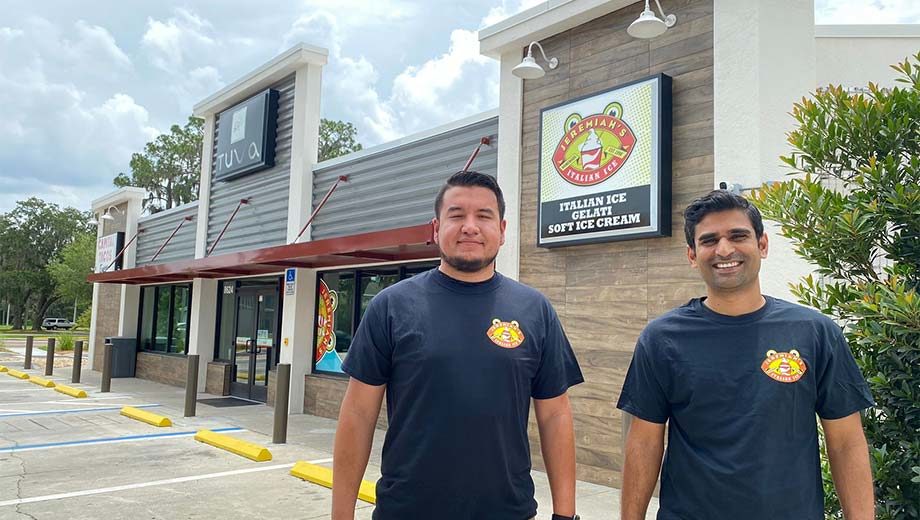Jeremiah’s a Uniquely Sweet Fit for this Franchisee’s Non-Traditional, Convenience Store Growth Strategy

Divyesh Patel’s very first business was a gas station. Little did he know then that his rapidly expanding multi-brand, multi-unit business portfolio would eventually be built around that iconic feature of the American commercial landscape.
He has since made investments in the Convenience store and restaurant segments, owning Circle K franchises and full-service food concepts as well as subleasing Dunkin units within his existing properties. Over the past several years, Divyesh has specialized in non-traditional concepts, capitalizing on the complementary features and advantages of having multiple brands operating out of a single venue. In 2018, he purchased the property that would eventually become a gas station that houses the Tuva Food Hall in Riverview, Florida.
“Having food in a gas station is a homerun,” said Divyesh. “I’m focusing on locally well-known brands, so as people are coming in to get gas, they’ll not only have multiple options to get food but also be able find products they already know and enjoy.”
As he was bringing his vision of an upscale, destination food hall to life, he wanted to ensure the environment would be family-friendly and provide an experience that the community would love. In addition to local pizza and taco concepts, Divyesh knew Jeremiah’s Italian Ice would be a uniquely sweet fit to his non-traditional franchise portfolio.
An Italian Ice Franchise Adds Decadent Layers of Simplicity, Efficiency
After visiting Orlando on a family vacation, Divyesh’s kids discovered the wonders of Jeremiah’s Gelatis, which is what first captured his interest. He has significant experience in operating restaurant concepts – having opened upwards of 10 other restaurants – and was struck by the operational simplicities that differentiate Jeremiah’s.
“You don’t have to rely on a professional cook or traditional restaurant employees,” Divyesh explained. “There’s no food preparation; there aren’t any kitchens.”
The sweet simplicity cuts down on labor and food costs. He previously owned a Greek restaurant and recalls how much time and money is spent on food preparation alone.
“You have people in the back of the house preparing food for the next shift, the next day,” he said. “There are countless hours when you have employees working – in the morning or at night – when your doors are closed and you aren’t making money.”
Since Jeremiah’s products require little-to-no preparation, Divyesh has been able to significantly cut down on labor costs. Opening and closing procedures typically take less than 30 minutes, allowing him to maximize profits.
“The concept is very economical,” said Divyesh. “The equipment is the biggest expense, but food costs are substantially lower than other restaurant concepts, and there’s virtually no food waste.”
And most importantly, the operational simplicity of the Jeremiah’s franchise concept makes it flexible enough to fit into a variety of non-traditional formats. While traditional free-standing locations typically have a footprint of between 800 – 1,200 square feet, non-traditional locations can require as little as 250 square feet. This gives franchisees like Divyesh the freedom to adapt the franchise to whatever the spatial requirements dictate.
“For me, it’s a huge advantage to have four businesses in a single location,” Divyesh explained. “Instead of four individual managers, I can have one general manager overseeing everything and take advantage of existing talent.”
Leaping into the Future with Non-Traditional Locations
A big reason Divyesh is developing his business portfolio with non-traditional locations with franchise concepts like Jeremiah’s is because of the opportunities for growth and ability to mitigate risk.
As he’s looking at future development opportunities, his focus is on co-branded locations with specific criteria for real estate.
“My No. 1 goals is to expand through gas stations similar to Tuva Food Hall, but if on-site requirements prevent gas station buildouts, I’m looking for areas with shopping areas that have strong anchors like grocery or big-box home improvement retailers,” said Divyesh.
The idea behind gas station food halls or free-standing co-branded units is based on a common premise: giving customers multiple options for what they can eat creates more opportunities for Divyesh to generate revenue. Many people will make a trip to get ice cream, and if they find they can buy lunch or dinner during the same trip, it’s a win-win situation, Divyesh emphasized.
“We have a growth plan – we want to have 10-20 gas stations with food operations as a critical component,” said Divyesh. “We’re also working on giving other existing Jeremiah’s franchisees the opportunity to open non-traditional locations within the gas stations we own.”
With Jeremiah’s specifically, Divyesh is looking to open two more units in Florida by end of next year and is looking at other states to potentially develop as well.
Start Hopping with the Frog Squad While You Still Can
All Phase 1 development areas in Florida have officially been scooped up, but there are still many opportunities available to be a part of the hottest franchise opportunity with the coolest treats!
Get started by downloading our franchise guide and learn more about our traditional and non-traditional opportunities.